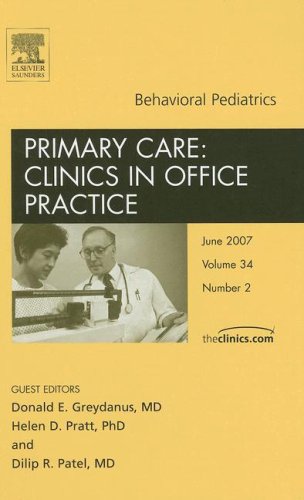

Most ebook files are in PDF format, so you can easily read them using various software such as Foxit Reader or directly on the Google Chrome browser.
Some ebook files are released by publishers in other formats such as .awz, .mobi, .epub, .fb2, etc. You may need to install specific software to read these formats on mobile/PC, such as Calibre.
Please read the tutorial at this link. https://ebooknice.com/page/post?id=faq
We offer FREE conversion to the popular formats you request; however, this may take some time. Therefore, right after payment, please email us, and we will try to provide the service as quickly as possible.
For some exceptional file formats or broken links (if any), please refrain from opening any disputes. Instead, email us first, and we will try to assist within a maximum of 6 hours.
EbookNice Team

Status:
Available4.5
17 reviews(Ebook) Behavioral Pediatrics An Issue of Primary Care Clinics in Office Practice 1st Edition by Donald E Greydanus, Helen Pratt, Dilip R Patel - Ebook PDF Instant Download/Delivery: 9781416043607 ,1416043608
Full download (Ebook) Behavioral Pediatrics An Issue of Primary Care Clinics in Office Practice 1st Edition after payment

Product details:
ISBN 10: 1416043608
ISBN 13: 9781416043607
Author: Donald E Greydanus, Helen Pratt, Dilip R Patel
(Ebook) Behavioral Pediatrics An Issue of Primary Care Clinics in Office Practice 1st Edition Table of contents:
An Introduction to Evidence-Based Medicine
Definition of evidence-based medicine
Evidence-based medicine focuses on patient outcomes
Step 1: Develop a specific answerable question from a clinical problem
Step 2: Search the best evidence that answers that question
Step 3: Critically assess that evidence for its relevance, validity, and usefulness to the patient and practice
Step 5: Evaluate the performance of that practice and revise as new evidence becomes available
Summary
References
Evolving Medical Knowledge: Moving Toward Efficiently Answering Questions and Keeping Current
References
Is the Article from a Peer-Reviewed Journal?
Step one: Conduct an initial validity and relevance screen
Is the study sponsored by an organization that may influence the study design or results?
Will this information, if true, require me to change my current practice?
Step three: Evaluate the validity of the article based on its intent
Is the study a randomized controlled trial?
Are the subjects in the study similar to mine?
Are all participants who entered the trial properly accounted for at its conclusion?
Are the results clinically as well as statistically significant?
Were there other factors that might have affected the outcome?
Suggested readings on critical reading skills
Step One in Critically Assessing an Original Research Article
Determining validity of an article about therapy
Determining validity of an article about causation
Determining validity of an article about prognosis
References
Cardiovascular Health and Interventions
Smoking cessation
Estimating probability of significant coronary artery disease in the asymptomatic patient
Cardiac stress imaging
Invasive testing
Screening diabetic patients
Preoperative evaluation
Antiplatelet therapy and anticoagulation
Lipid-lowering therapy
Angiotensin-converting enzyme inhibitor therapy
Revascularization
Risk factor modification
Counseling
Alternative therapies
Monitoring patients with known coronary artery disease
Use of cardiac testing during follow-up
References
Heart Failure
Prognosis
Hypertension
The Seventh Report of the Joint National Committee on Prevention, Detection, Evaluation and Treatment of High Blood Pressure
Evaluation
Treatment: Lifestyle modification
Essential hypertension
Patients who have concomitant diagnoses
Coronary artery disease
Diabetes
Shape Up America
References
Mortality and Evidence Summaries
All-cause and cardiovascular mortality
Bottom line
Evidence summary
Clinical commentary
Evidence summary
Bottom line
Evidence summary
Evidence summary
Diabetes Mellitus
Evidence summary
Bottom line
Evidence summary
Evidence summary
Evidence summary
Summary
References
An Evidence-Based Approach to the Management of Depression
Should physicians screen for depression and which screening tool should be used?
Are there any meaningful differences between newer and older antidepressants?
What drugs should primary care physicians prescribe first-line for depression?
If patients are not responding to treatment, what should be done next?
How long should patients who have depression be treated with antidepressants?
Which antidepressants are safe in pregnancy?
Should antidepressants be used in patients who have experienced a myocardial infarction or stroke?
Does counseling provide a measurable therapeutic effect in depressed patients?
Should health care providers recommend an exercise program for their patients who suffer from depression?
What is evidence behind hormonal supplements?
Is there any proven benefit of light therapy in the treatment of depression?
What about collaborative therapy and disease management programs?
Are there any other treatment modalities that are supported by evidence?
References
Osteoporosis
Vitamin D
Risk factors
Screening frequency
Bisphosphonates
Raloxifene
Parathyroid hormone
References
Women’s Health
Women’s Health Initiative
Other studies and the type of breast cancer
North American Menopause Society
Nonoral estrogens
Botanicals
“Off-label” therapy
People also search for (Ebook) Behavioral Pediatrics An Issue of Primary Care Clinics in Office Practice 1st Edition:
what is a behavioral problem in a child
behavioral problems in pediatric patients
what causes behavioral problems in toddlers
types of behavioural problems in child
issues in pediatrics
Tags: Donald E Greydanus, Helen Pratt, Dilip R Patel, Behavioral Pediatrics, Primary Care Clinics